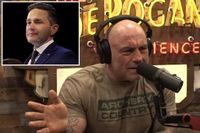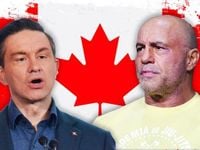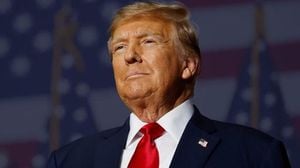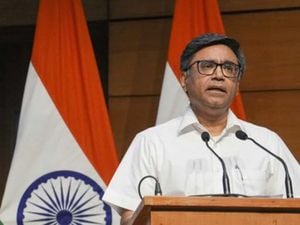In a surprising turn of events, Canada’s Liberal Party secured its fourth consecutive federal election victory on April 28, 2025, despite facing significant controversies during its previous term under former Prime Minister Justin Trudeau. The election results came as a shock to many, including prominent podcaster Joe Rogan, who expressed his disbelief during a recent episode of his popular podcast.
Initially, Conservative Party leader Pierre Poilievre seemed poised to take the reins of the government, especially after Trudeau announced his intention to step down. However, the election took a dramatic turn, largely influenced by external factors, including U.S. President Donald Trump’s aggressive rhetoric regarding Canada, which included threats of annexation and the imposition of tariffs. Ultimately, Liberal candidate Mark Carney emerged victorious, a result that Rogan and his guest, hunting podcaster Cameron Hanes, found perplexing.
During the podcast episode, Hanes highlighted the Liberal government’s handling of the infamous 2022 Freedom Convoy protest, which saw hundreds of truckers and thousands of supporters occupy downtown Ottawa in opposition to COVID-19 vaccine mandates and other government restrictions. Rogan recalled the “insane” incident where individuals who donated to the Freedom Convoy had their bank accounts frozen, stating, “People who donated to them got their bank accounts frozen. And then that same party just won again. Good job, Canada!”
Rogan further criticized Poilievre for declining an invitation to appear on his podcast in the lead-up to the election. “I offered to have that Pierre guy come on the podcast. He didn’t do it. Wouldn’t do it. Thought it was too problematic. Or whatever,” Rogan remarked, adding that a source indicated Poilievre’s advisers were discouraging him from participating. Rogan’s tone suggested that he believed appearing on his show could have benefitted Poilievre’s campaign.
The podcaster also reflected on Trump’s lengthy appearance on his show, which some observers considered a pivotal moment in the election. The 2024 election has been dubbed the “podcast election,” illustrating the growing influence of podcasts over traditional media platforms. Hanes defended Rogan’s interview style, asserting, “You’ve never been the ‘gotcha’ guy,” emphasizing that Rogan would have posed straightforward questions to Poilievre about Canada’s political landscape.
Rogan expressed his desire to ask Poilievre about the challenges facing Canada, saying, “I would just ask him questions like, ‘What’s wrong with Canada? How did this happen? What can be done to reverse some of these things that have been put into place?’ Real simple stuff. I don’t know anything about Canada’s politics. It would have been fun.”
Rogan’s commentary comes on the heels of his previous endorsement of Poilievre as Canada’s next prime minister, urging his Canadian listeners to reject Trudeau’s Liberals. “Canada, get your s— together! Come back. Come back to what you used to be,” he implored, praising Poilievre for making sense as a candidate.
Despite the election results, Rogan remained critical of the Liberal Party’s choice in leadership. After Carney was named the new Liberal leader, Rogan remarked, “They got a new guy, who’s just as bad. It’s the same thing … 150 people voted, and now they have a new guy running the country.” His comments reflect a broader frustration among some segments of the Canadian populace regarding the continuity of Liberal leadership.
Trump’s ongoing tensions with Canada have also been a topic of discussion, especially following his promises to impose tariffs on Canadian imports and his controversial suggestions that Canada could become the 51st state. In a recent meeting with Carney, Trump reiterated that Canada would never be for sale, to which Trump responded, “Never say never.” This exchange underscores the delicate balance of U.S.-Canada relations and the potential implications for Canadian politics.
In the wake of the election, Poilievre’s campaign strategy has come under scrutiny. Some insiders noted a conscious decision to avoid American media outlets, fearing backlash from Canadian media if they engaged with conservative U.S. personalities. This strategy may have limited Poilievre’s exposure and ability to connect with a broader audience.
Rogan’s podcast has gained substantial traction, boasting over 14.5 million followers on Spotify and nearly 20 million on YouTube. His platform’s influence was evident in the previous U.S. presidential election, where his invitation to both candidates led to significant discussions that swayed public opinion.
As Canada moves forward with its new leadership, the implications of the recent election and the ongoing dynamics between Canada and the United States will likely remain focal points of discussion. Rogan’s observations reflect a growing sentiment among some Canadians who are questioning the direction of their country and the leadership choices being made.
In summary, the Liberal Party’s continued dominance in Canadian politics raises questions about voter sentiment and the impact of external factors on election outcomes. As the country navigates its political landscape, the role of media, including podcasts, will undoubtedly play a crucial part in shaping public discourse.





